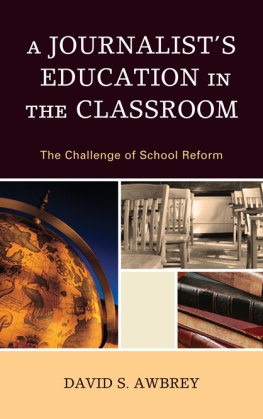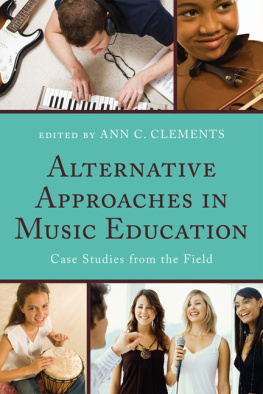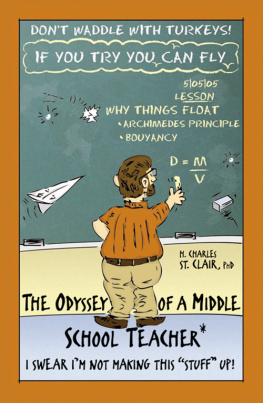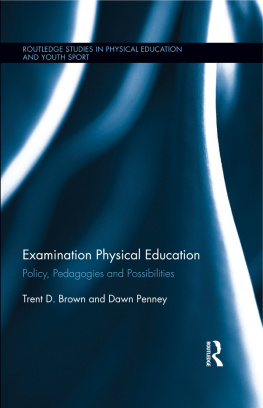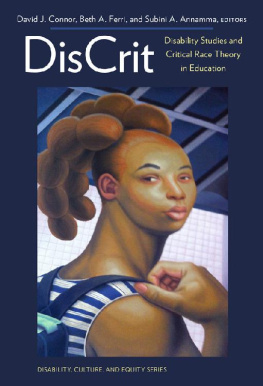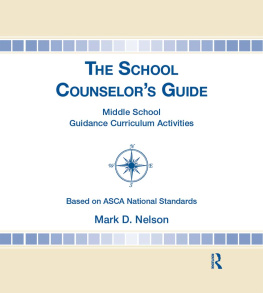A Journalists Education
in the Classroom
The Challenge of School Reform
David S. Awbrey
Rowman & Littlefield Education
A division of
rowman & littlefield publishers, inc.
Lanham New York Toronto Plymouth, UK
Published by Rowman & Littlefield Education
A division of Rowman & Littlefield Publishers, Inc.
A wholly owned subsidiary of The Rowman & Littlefield Publishing Group, Inc.
4501 Forbes Boulevard, Suite 200, Lanham, Maryland 20706
http://www.rowmaneducation.com
Estover Road, Plymouth PL6 7PY, United Kingdom
Copyright 2011 by David S. Awbrey
All rights reserved. No part of this book may be reproduced in any form or by any electronic or mechanical means, including information storage and retrieval systems, without written permission from the publisher, except by a reviewer who may quote passages in a review.
British Library Cataloguing in Publication Information Available
Library of Congress Cataloging-in-Publication Data
Awbrey, David S.
A journalists education in the classroom : the challenge of school reform /
David S. Awbrey.
p. cm.
Includes bibliographical references and index.
ISBN 978-1-60709-713-6 (cloth : alk. paper) ISBN 978-1-60709-715-0 (electronic)
1. Middle school teachingUnited StatesAnecdotes. 2. Awbrey, David S.
3. JournalistsUnited States. 4. Middle school teachersUnited States. 5. Teacher-student relationshipsUnited States. 6. TeachingUnited States. 7. EducationUnited States. 8. Educational changeUnited States. I. Title.
LB1623.5.A95 2011
373.1102dc22
2010023330
` The paper used in this publication meets the minimum requirements of
American National Standard for Information SciencesPermanence of Paper
for Printed Library Materials, ANSI/NISO Z39.48-1992.
Printed in the United States of America
To my daughter, Grace, and her generation, in hopes that their education will be as meaningful and their future in the United States
as bright as mine were at their age.
Chapter One
v
Why Teach? Why Pipkin?
Ive spent my life arguing. My mother says that as a child I could coax paint off a wall. For most of my journalism career, I was an opinion writer, commenting on issues ranging from Mideast policy to neighborhood zoning. Ive taken on, and held my own against, some of the most powerful peoplegovernors, U.S. senators, corporate CEOs, presidential candidatesin American public life.
But here I am in a seventh-grade social studies class getting verbally slammed by an insufferable thirteen-year-old who is using me as a human piata before twenty-five other highly amused adolescents.
After more than thirty years working for various newspapers and wire services around the country, I decided to teach history in a lower-income middle school in Springfield, Missouri. Abandoning the cynicism and egoism of journalism, I enrolled at Drury University, a local liberal arts college noted for its education program, received my teaching certificate, and entered the classroom with the idealism and naivet of a twenty-three-year-old on his first job.
In other words, I was totally unprepared for Marshall Perry.
Marshall was placed on earth to make life miserable for teachers. He was a destroyer of dreams, a dasher of hopes, and a perpetual pest who could sabotage any lesson plan. He was whip-smarthis personality balanced between feral animal and twisted genius. He was obstinately quarrelsome enough to become a cable TV political talk-show host; he was sadistically sly enough to become a serial killer.
A natural agent of chaos, he gave good value for his nastiness. Every day was something differentsnapping a girls bra on Monday, pilfering a neighbors book on Tuesday, instigating a fight on Wednesday, and so on through the Huck Finn manual of schoolboy mischief. He could quote the Book of Revelation, proof-texting it with the lyrics of Marilyn Manson.
Marshall and I were locked in several primal power struggles: teacher vs. student; adult vs. teenager; old lion vs. upstart cub; authority vs. rebellion; order vs. madness.
I was losing. He knew my disciplinary options were limited to oral reprimands that gave him the opportunity to argue back and banishments to the principals office that merely reaffirmed his highly prized and well-deserved reputation as the schools reigning bad boy. I also lacked the confident command over kids exhibited by the best veteran teachers. Word spread through Pipkin Middle School: Mr. Awbrey was easy prey. The principals verdict: Mr. Awbrey has classroom management issues.
Middle schools demand routine and predictability. Without it, schools would descend into adolescent savagery. Thats why administrators spend much of their time prowling the halls and peering through door windows to ensure that students are hunched over their desks, moving their pencils for whatever purpose. My principal practiced the pigeon theory of managementswoop in unexpectedly, poop all over the place, and fly away. I wanted to avoid giving her excuses to enter my classroomsomething Marshall was making impossible. He had become an early test of my professional survival.
The occasion came four weeks into the school year, a defining moment when kids decide who is boss. A teacher who fails to assert command faces months of jeering taunts and incessant disruption, making learning impossible. My plan was to humble Marshall during European map study, show that he wasnt as bright as he and everyone else believed, and restore the primeval masculine, hierarchical order in my classroom. I was going to air this punk weasel out.
Marshall sat on the far right side of the front row, where I had quarantined him from the rest of the classroom but could still watch him. Within minutes, he started picking a spat with a neighbor over a notebook. Half-heartedly, really just egging him on, I politely asked him to stop. Body language must have given me away; he backed down when normally he would have responded with brash back talk or profanity.
The air was tense. Marshalls unexpected withdrawal perked the other students up, their internal barometers sensing an ominous disturbance in classroom atmospherics.
Using an overhead projector, I flashed a political map of Europe on the screen to prepare for our upcoming lessons in medieval and Renaissance history. I pointed to various countries whose names had been blanked out and asked the students to identify them. We located Italy, Greece, and Spain. Then came France.
Isnt it true that all the French are gay? Marshall growled in a surly, accusatory voice. Why are we studying a country of homos? That should be illegal. Why are you promoting gays, Mr. Awbrey? Are you gay?
In middle school, the term gay usually refers to anything the kids dont likepants that arent blue jeans, almost any book, music favored by baby-boomer teachers. When I gave a test, someone would say this is so gay to express their displeasure. This wasnt one of those cases. It was a full-bore assault on me and the authority of teachers in general.
But I welcomed Marshalls challenge and counterattacked head on.
If you knew anything about France you would see that the gay thing is just a stupid stereotype, I snapped sarcastically. Furthermore, for your information, Im married and have an eight-year-old daughter. So, no, Im not gay.
Sensing an advantage, I pushed ahead, throwing in the classic line from the Jerry Seinfeld show. Not that theres anything wrong with that.
Huge mistake. Im not living in Upper West Side Manhattan.
But Mr. Awbrey, the Bible says that gays will burn in Hell, a normally quiet girl in the corner blurted out in genuine shock that a teacher in the Ozarks of southern Missouri would in any way condone homosexuality.

